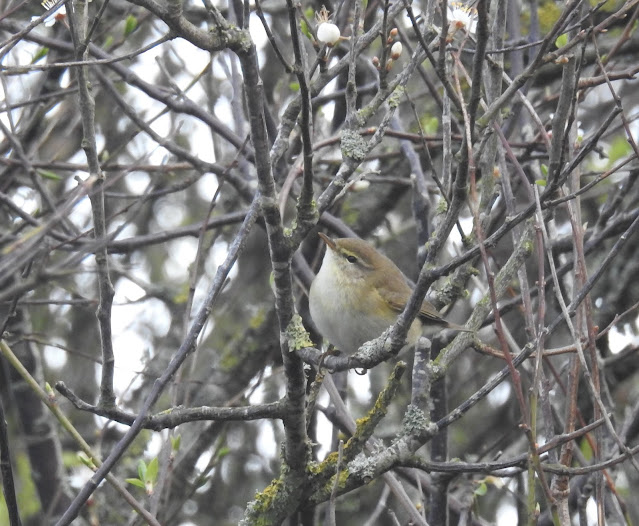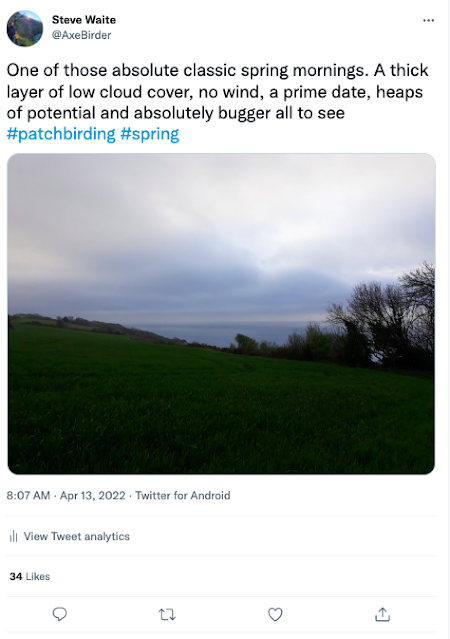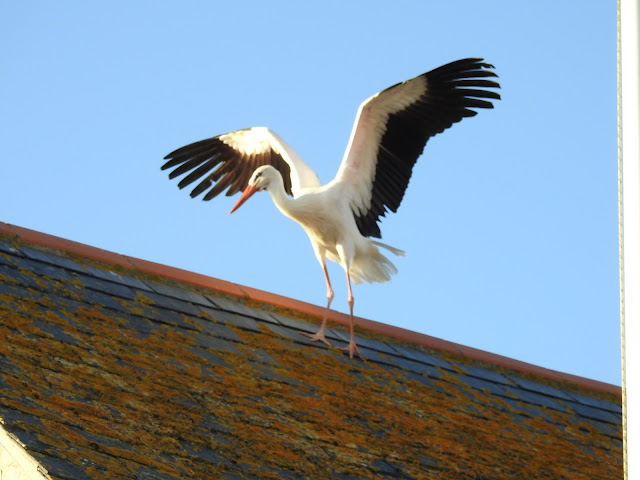I am afraid this isn't a nice post to write and not one that I want you to enjoy reading. But from what I've seen and read this year I feel compelled to write it.
Tracking bird populations and trends of migrant bird species at a migration site is nigh-on-impossible, there are just too many variables when it comes to how many grounded/passing migrant birds you see on a day to day basis. Wind direction/air pressure/weather where you are birding, wind direction/air pressure/weather where the migrant birds have set off from, food availability during their migration, etc. For example a warm, sunny, calm and dry April will almost guarantee low numbers of grounded migrants, wherever you are and regardless of how many birds are actually passing over.
 |
| Nothing to see here, literally... |
However when a trend is sustained, and when what would previously have been considered 'excellent conditions' happen often enough, and nothing happens, it begins to paint a picture. A very worrying picture.
This spring and autumn on my beloved patch here in East Devon has been dire. Forget about the rarities and scarcities, they will always be rare and scarce, I am talking about common migrant birds.
I saw/heard 13 Willow Warblers here this spring. That is 13 in total throughout the entire spring. Only managed one more Wheatear, with 14 in all for me. I saw singles of Redstart, Spotted Flycatcher, Tree Pipit and Whinchat. No Garden Warbler, Grasshopper Warbler, Yellow Wagtail, Cuckoo, Turtle Dove or Pied Flycatcher.
 |
| Willow Warbler looking all common |
Whenever we have damp and dreary weather in April/May I try and get down into the Axe Valley at least once during the day in my never-ending quest for a patch Red-rumped Swallow. Every visit in these conditions this year showed pitiful numbers of hirundines, 20 - 30, when I would usually expect to see several hundred feeding low over the marshes. On two dates I did manage three figures just about but this was still a fraction of what I would expect to see.
Autumn hasn't been much better, well no better.
So is it just here? Are migration routes and/or bird populations shifting? Are they all retracting eastwards like Nightingales, Turtle Doves and Willow Tits? Well a browse of the websites of some of the UK's Bird Observatories will tell you the answer; Portland Bill, Dungeness, even Spurn. It is being witnessed everywhere, both spring and autumn of this year. Even birders who have spent time on Shetland this autumn have remarked about how few common migrants were there.
Too many times this year I have walked the fields of Axe Cliff and returned having noted just one or two of a species (like Willow Warbler) that should be plentiful. So I can't not begin to wonder what birding might be like in five, ten, twenty years time? Will 'two Willow Warblers and a Blackcap' represent a good morning of spring birding?
 |
| A tweet of mine from earlier this the year |
Add the recent outbreaks of Avian Influence into the picture, rampaging through some of our most-loved, cherished and rarest sea bird colonies this year - honestly it is enough to make me cry. I love birding and I always will, but looking at it in a very selfish way, I really am fearful for the future of my hobby.
Although I confess I am rapidly approaching my 40's (three years to go!) I'm not a grumpy birder, not by a long way I'd like to think. However there is just one more point I want to add to this depressing blog post, as quite frankly I just don't get it...
Should we really be putting so much focus, money and time into reintroducing White-tailed Eagles, White Storks, Great Bustards, Common Cranes, etc in the south of England when the basic foundations of our entire eco-system are clearly broken? What is wrong with the 'create the habitat and they will come' method?
 |
| White Stork showing a bit too well |
Surely we need to be working from the bottom up when it comes to conservation. Not that I am saying the complete collapse of our entire natural world is by any means an easy problem to fix.
It might be climate change to blame for the scarcity of common birds, but that could be due to the drought and heatwave we've just endured. When Swifts fell from the sky in London, it could be assumed that was on account of a lack of food and water. Extend that assumption to the ground-based species and I imagine all manner of birds go missing. We don't see the dead birds since natural scavengers are so efficient at finding them.
ReplyDeleteHi Steve, not sure if you've read it but I think Rebirding by Benedict Macdonald makes a good case for reintroducing species - including pelicans! - in the south of England. It talks about how many species will not recolonise former ranges without reintroductions such as those being undertaken
ReplyDelete